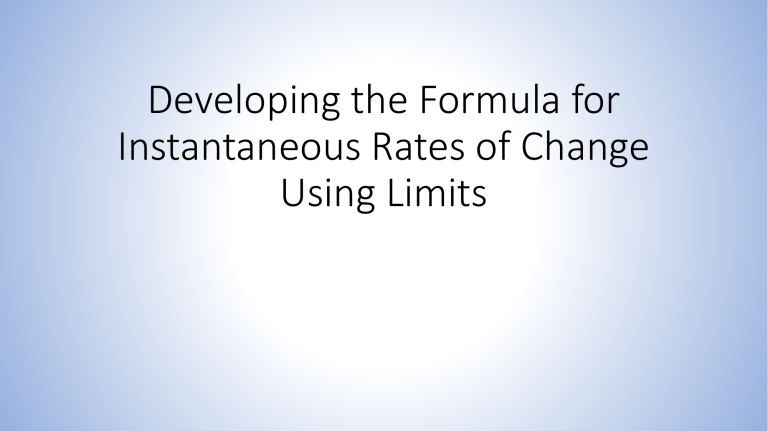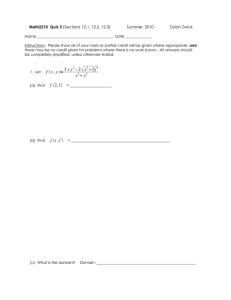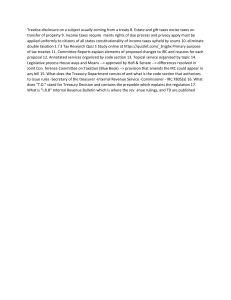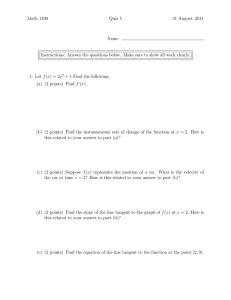1.2a Developing the Formula for Instantaneous Rates of Change (4)
advertisement

Developing the Formula for Instantaneous Rates of Change Using Limits Learning Goal: To understand and develop the formula for Instantaneous Rate of Change using limits. Success Criteria: Students can… • visually understand the concepts of secants, tangents, ARC and IRC from a graph. • develop and describe the notation and formulas needed to create the IRC formula from a graph. • apply the limit concept to develop, visualize and describe the IRC formula. • use technology to dynamically show the limit concept as applies to IRC. • Consider a function 𝑓 and a point 𝑃 𝑎, 𝑓(𝑎) . Choose a second, distinct point on the graph called 𝑄 𝑎 + ℎ, 𝑓(𝑎 + ℎ) . • For 𝑄 to be distinct from 𝑃, ℎ ≠ 0. • We could have instead defined the second point as 𝑄 𝑏, 𝑓(𝑏) but this is the version we want for defining derivatives in the next unit. • We should always use the same notation for 𝑄, regardless whether 𝑄 follows or precedes 𝑃. In MHF4U, you might have used 𝑄 𝑎 − ℎ, 𝑓(𝑎 − ℎ) when doing a preceding interval. Do NOT do that any more. We want the SAME formula for preceding and following intervals. • Instead, we will let 𝒉 > 𝟎 when we want 𝑄 to follow 𝑃 and we will let 𝒉 < 𝟎 when we want 𝑄 to precede 𝑃. • By this convention, 𝒉 represents the distance between the 𝑥 values of 𝑃 and 𝑄. • The slope of secant 𝑃𝑄 (ARC) becomes 𝑚𝑃𝑄 = 𝑓 𝑎+ℎ −𝑓(𝑎) 𝑎+ℎ −𝑎 = 𝑓 𝑎+ℎ −𝑓(𝑎) ℎ • Let us now think conceptually about how a limit works. lim The thing we control: We decide what this thing approaches The thing we are interested in: What is this thing approaching? = The answer to the question: What is this thing approaching? • Let’s now look at how to apply these ideas to the diagram to get IRC. lim We want to make point 𝑄 approach point 𝑃 We want to make ℎ approach 0. We are interested in the secant line: What is it approaching? We are actually interested in the slope of the secant line (ARC): What is it approaching? = The answer: The tangent line The answer: The slope of the tangent line (IRC) • We define the slope of the tangent (IRC) of a function 𝑓 at 𝑥 = 𝑎 to be: 𝑓 𝑎 + ℎ − 𝑓(𝑎) 𝑚 𝑇 = lim ℎ→0 ℎ • Recall: ℎ ≠ 0 is part of this limit by definition. • By definition, this formula is an indeterminant form. • Consider how this limit allows for 𝑄 to approach 𝑃 from both sides.


